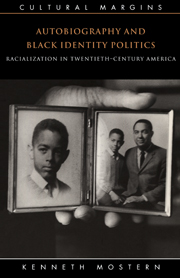Book contents
- Frontmatter
- Contents
- Acknowledgments
- Part one: Theorizing race, autobiography, and identity politics
- 1 What is identity politics? Race and the autobiographical
- 2 African-American autobiography and the field of autobiography studies
- Part two: The politics of Negro self-representation
- Part three: The dialectics of home: gender, nation, and blackness since the 1960s
- Notes
- Works cited
- Index
1 - What is identity politics? Race and the autobiographical
Published online by Cambridge University Press: 02 December 2009
- Frontmatter
- Contents
- Acknowledgments
- Part one: Theorizing race, autobiography, and identity politics
- 1 What is identity politics? Race and the autobiographical
- 2 African-American autobiography and the field of autobiography studies
- Part two: The politics of Negro self-representation
- Part three: The dialectics of home: gender, nation, and blackness since the 1960s
- Notes
- Works cited
- Index
Summary
I believe in the recognition of devices as devices – but I also believe in the reality of those devices. In one century men choose to hide their conquests under religion, in another under race. So you and I may recognize the fraudulence of the device in both cases, but the fact remains that a man who has a sword run through him because he will not become a Moslem or a Christian – or who is lynched because his is black – is suffering the utter reality of that device of conquest. And it is pointless to pretend that it doesn't exist – merely because it is a lie.
Lorraine HansberryO my body, make of me always a man who questions!
Frantz FanonRepresentation has not withered away.
Gayatri SpivakIdentifying “identity politics”
It has become typical to see the widest variety of writers of both popular and academic work arguing against, or discussing the limitations of, something which they call “identity politics.” The positions which are grouped together by this name are not generally categorized that way by anyone who actually holds these positions: such people might refer to themselves, variously, as “nationalists,” “feminists,” “Afrocentrists,” or “multiculturalists,” with further adjectival modifications referring to specific modes of nationalism or feminism (“cultural,” “economic”), or specific political modifiers, like “liberal,” “radical,” or “critical,” the last term of which once denoted marxist sympathies, but does not anymore.
- Type
- Chapter
- Information
- Autobiography and Black Identity PoliticsRacialization in Twentieth-Century America, pp. 3 - 27Publisher: Cambridge University PressPrint publication year: 1999

